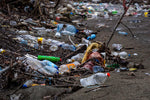
A Recycling Study Unveils an Unexpected Torrent of Microplastics
, by Planet Green, 3 min reading time

, by Planet Green, 3 min reading time
In a groundbreaking revelation, a recent study challenges prior assumptions regarding the repercussions of plastic recycling, exposing a considerably graver issue. The study, pioneered by researchers from the University of Strathclyde in Glasgow, delved into the operations of a premier recycling facility located in the United Kingdom. Astonishingly, their findings indicate that this facility alone disperses a staggering 3,233 tons of micro-plastics annually, constituting approximately 13% of the total plastic volume subjected to recycling procedures.
Lead researcher Erina Brown states, "It’s scary because recycling has been designed in order to reduce the problem and to protect the environment. This is a huge problem we’re creating.”
The gravity of the situation is not lost on Brown, who passionately emphasizes the dire need for an immediate and substantial reduction in both plastic consumption and production. "This disheartening discovery underscores the urgency with which we must address our rampant plastic consumption and production," she said.
Regrettably, a meager 5% of plastic waste undergoes recycling procedures annually here in the United States, leaving a vast majority, estimated at approximately 40 million tons of municipal plastic waste in 2021, to contaminate bodies of water and exacerbate the burgeoning micro-plastics crisis.
“For me, it highlights how drastically we need to reduce our plastic consumption and production,” Brown said.

Shedding Light on the Significance of the Micro-plastics Surge
The prevalence of micro-plastics assumes a bigger importance due to their infiltration of water bodies as well as the atmosphere globally. These minute plastic particles, measuring less than 5 millimeters in length, pose a toxic threat to humans, animals, and plants, particularly when their size falls below 10 microns—equivalent to the dimensions of a human red blood cell.
The research conducted in the study revealed a disquieting truth: recycling, often hailed as an environmentally friendly practice, still yields substantial adverse effects for humanity, wildlife, flora, and the planet at large.
"These findings, although disconcerting, are not entirely unexpected," remarked Judith Enck, a former EPA official and prominent advocate against plastic usage. "This exemplary recycling facility serves as a stark reminder of the grave ramifications associated with our reliance on plastics. The issues it highlights extend even to the infrastructure designed for plastic recycling. It serves as an urgent call to action, urging us to embrace a path of reduced consumption.”
Addressing the Micro-plastics Menace: Paving the Way for Solutions
The study's conclusive findings proposed that the incorporation of water filtration systems within recycling plants can profoundly mitigate the release of micro-plastics. At the British facility investigated by the researchers, the implementation of such a filtration system resulted in a drastic reduction, with micro-plastics diminishing from 13% to a mere 6% of the total plastic volume.
Nonetheless, despite the efficacy of filters, recycling plants continue to discharge an alarming quantity of micro-plastics into our environment. The most effective course of action lies in reducing our consumption of plastic through all available means, reducing our reliance on plastic products and items encased in plastic packaging and curtailing the global demand for these hazardous materials.
Choosing remanufactured goods, adopting reusable water bottles and glass food containers, and consciously shunning unnecessary plastic packaging are tangible steps that each individual can take to help reduce plastic consumption and contribute to the cause.

When people talk about e-waste, the conversation usually centers on big-ticket items: cell phones, laptops, televisions, or kitchen appliances. But one of the most common...

Most people see a printer cartridge as a small, everyday item. But behind that small piece of plastic is a surprisingly large environmental cost. Every...

The phrase “circular economy” has become a buzzword in sustainability circles, but what does it really mean? In simple terms, it’s about designing products and...

For years, recycling ink cartridges often meant relying on office collection bins, retail drop-off points, or corporate programs tied to large accounts. But as more...